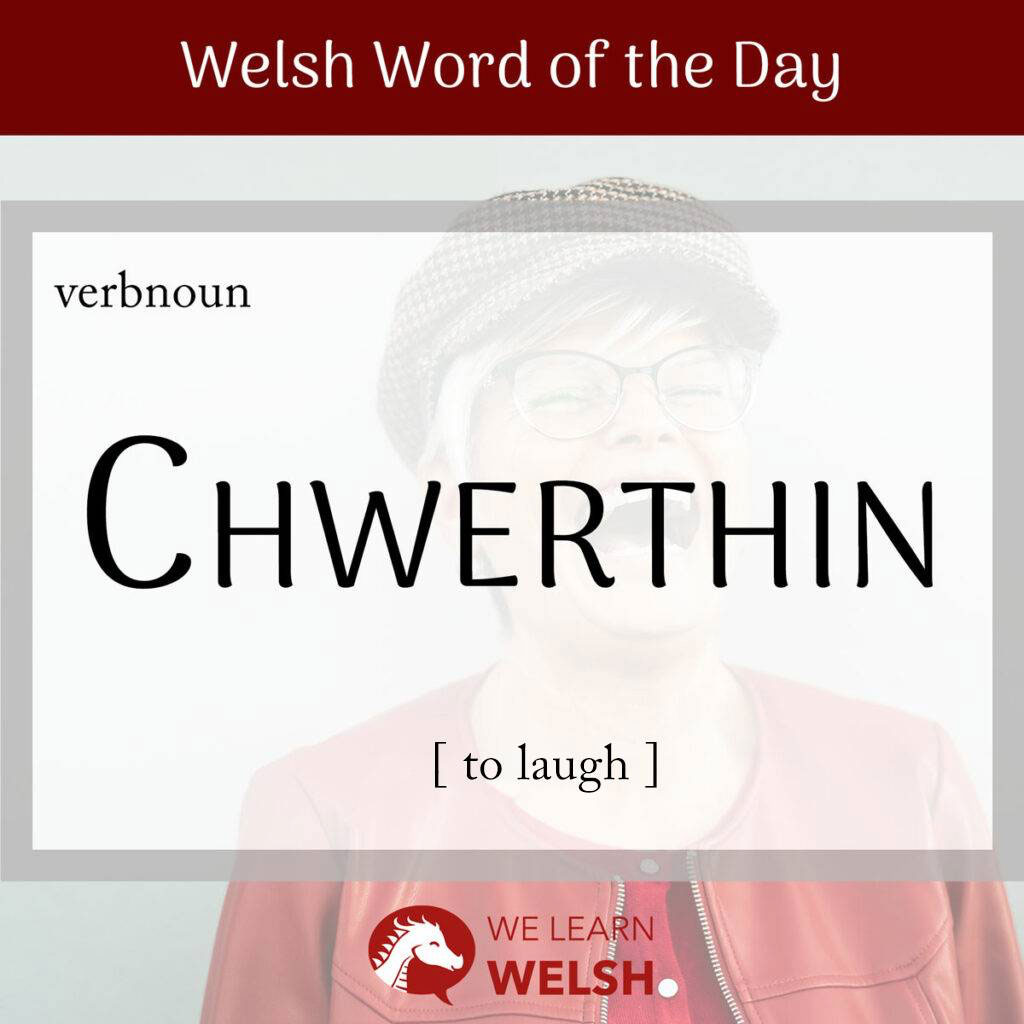Did you know that chwerthin (laughing) actually originally evolved as a form of communication? That’s why we’re more likely to chwerthin at a jôc (joke) told by a ffrind (friend) than someone we don’t know.
chwerthin
to laugh
This word can be tricky to pronounce because it starts with the unique letter ch, which is even more difficult to say when you immediately move into a chw sound. It may help to at first add an extra syllable, so you’re saying chy–werthin, and then gradually try to say the word faster and faster.
And actually, some people in South Wales shorten chwerthin to hwerthin or werthin, like this:
So if you’re really struggling with ch, that could be one trick to get out of it!
The word comes from the proto-Celtic root word *swaryeti (to laugh), but it has cousins much further afield than Celtic. This is because it originally evolved from the proto-Indo-European *swer (to make a sound). Other words coming from *swer include the Sanskrit svarati (to sing) and English’s own to swear.
Over the years, many different words have been employed to mean ridiculous or laughable, almost always deriving from chwerthin. For example, chwerthinllyd, chwerthinbair, or chwerthinus. Today almost everyone uses chwerthinllyd.
Ma‘ hi’n gwybod sut i ‘neud i mi chwerthin.
She knows how to make me laugh.
Chwerthin is technically how you would say laugh as both a verb and a noun. But it’s not that common to use it as a noun in Welsh. Phrases which use the noun form in English are just translated differently.
- gan chwerthin = with a laugh
- peri chwerthin = to get a laugh
- glaschwerthin = to force a laugh
- torri allan i chwerthin / bosto chwerthin = to break into a laugh
- chwerthin yn y diwedd = to have the last laugh
Also, a lot of these kinds of phrases are translated with the word hwyl (fun) instead, like for a laugh, which becomes o ran hwyl.
Since chwerthin is primarily a verb, you may be wondering how to conjugate it. There is a lot of variance here, especially between dialects. For example, for the past preterite in the first person, some would say chwerthinais, some would say chwerthais, some would go for chwerthis, and in literary contexts you would see chwerddais or chwarddais.
Because of this variation it’s even more common than with other Welsh verbs to use periphrastic conjugation instead. This means that the word chwerthin is left intact and the tense and person of the sentence is conveyed via auxiliary verbs. So instead of saying chwerthinais or another alternative, you could say wnes i chwerthin (I did laugh).
Chwarddodd Mererid wrth siarad.
Mererid laughed as she spoke.
You may want to explain the digrifwch (humour) of what exactly you’re laughing at. To do this you’ll need the phrase am ben (about the head of), sometimes casually shortened to just am.
So laughing at someone is chwerthin am ben rhywun. In this case, too, the word hwyl can be an alternative way of expressing laughter and merriment, as in the phrase gwneud hwyl am ben rhywun (literally making fun about someone’s head).
Roeddwn i’n chwerthin am ben jôc Mair.
I was laughing at Mair’s joke.
To emphasise a particularly uproarious bout of laughter, also translated as chwerthin, you can use phrases like:
- chwerthin tan siglo ochrau = laughing until your sides shake
- chwerthin nes bod yn ddau dwbwl = laughing until you’re doubled over
- chwerthin hyd at ddagrau = laughing until you’re in tears
- chwerthin dros bobman = to laugh out loud (literally to laugh everywhere)
- chwerthin yn foliog / chwerthin yn galonnog / chwerthin yn iach = to laugh heartily
- marw chwerthin = dying laughing
- rholio chwerthin = rolling about laughing
- crio chwerthin = crying laughing
On the other hand, to laugh covertly may be translated as chwerthin yn fy nwrn (to laugh in my fist) or chwerthin dan fy nannedd (to laugh under my teeth). You could also use the synonyms tithian or piffian, which both mean to snigger, though how commonly used or understood they are varies geographically.
Can you use chwerthin in a sentence? Bonus points if it’s un doniol (a funny one)!


